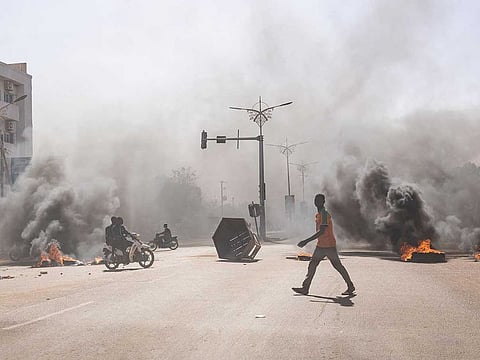Why Burkina Faso asked France to leave
The nature of the shift will be determined by the outcome of the ongoing global conflict

Though it was clear that Burkina Faso was eventually going to follow in the footsteps of Mali and the Central African Republic (CAR), Ouagadougou’s decision to break military ties with France was not as simple as media sound bites want us to believe.
The conventional wisdom is that these countries are walking away from their former colonial master, France, to forge alternative alliances. These convenient analyses are largely shaped by the geopolitical tug-of-war between old and new superpowers: The US and its Nato allies on the one hand, and Russia and China on the other.
Though global rivalry, especially on the resource-rich African continent, is an important component in understanding Burkina Faso’s decision — and earlier, similar decisions by Mali in April, and CAR in December — more attention needs to be paid to the logic of these African countries’ own political discourse.
On Jan. 21, Burkina Faso officially asked France to withdraw its troops from the country within a month. French President Emmanuel Macron seemed perplexed by the request. He answered that he was awaiting clarifications from Burkina Faso’s transitional President, Ibrahim Traore.
“At the current stage, we don’t see how to be more clear than this,” the Burkina Faso government’s spokesperson, Rimtalba Jean Emmanuel Ouedraogo, speaking on national television, said on January 23.
Military agreement with France
Ouagadougou’s decision was in reference to 400 French soldiers stationed in the country following a military agreement signed with Paris in 2018.
The agreement between Paris and Ouagadougou was part of a series of agreements signed between France and several African countries to form regional economic and military alliances, with the understanding that France would be helping these countries achieve stability amid threats of various militant groups.
Mali, which suffered a series of military coups and deadly rebellions that threatened to divide the country, was the focal point of the French military redeployment into Africa, resulting in the launch of several major campaigns starting in January 2013 with Operation Serval and, later, Operation Barkhane.
As time passed, the French government maintained that the regional accords were signed per the invitation of African countries, which are mostly based in the Sahel region.
Critics sometimes hit back, saying that France is not an equal partner in Africa.
There was little proof that Operations Serval and Barkhane achieved their intended goals, or that any of the countries involved in the French scheme achieved political or economic stability.
Though military coups were a common occurrence in many African countries following the formal end of colonialism on the continent, the new governments in Mali, CAR and Burkina Faso used a different kind of political discourse, which accused the former regimes of treason, while also blaming France.
Burkina Faso no exception
Like Mali and CAR — and other African countries — Burkina Faso never had real political margins that would allow it to operate independently from its former colonial masters. These margins did exist, but were almost completely shut down following the collapse of the Soviet Union.
The USSR was seen as a trusted ally by various African governments, which used Soviet support to balance out Western influences and pressures on the highly contested continent.
The demise of the USSR meant the end of that balancing act and the full return of Africa to the grip of the western sphere.
The changing global political dynamics resulting from the US/Nato-Russia/China rivalries have, again, opened some of these margins.
The countries that dared to be first to cross to the other camp — Mali, CAR, and now Burkina Faso — were the countries that had little to lose as a result of this political gamble. They enjoyed no political stability, little sovereignty and no economic prospects.
This means that the future could also witness more such geopolitical shifts. The nature and speed of these shifts will be largely determined by the outcome of the ongoing global conflict.
Ramzy Baroud is a journalist and author. He is the author of six books.
Sign up for the Daily Briefing
Get the latest news and updates straight to your inbox



